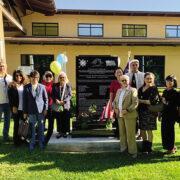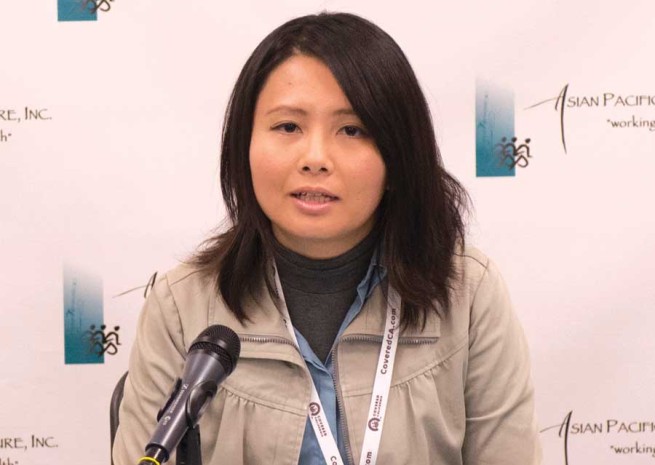LOS ANGELES – Amid ‘conflicting’ and ‘misleading’ information about the Affordable Care Act (ACA), in a press briefing, officials of Asia Pacific Health Care Ventures (APHCV) emphasized that proper education about the health reform law is vital, so that people can understand what they’re going to get under the law and be able to take advantage of these benefits.
“Unfortunately, out in the community, there has been more negative press coverage on the ACA than positive ones – [or those that depict] accurate information regarding the health insurance expansion,” APHCV Chief Executive Officer Kazue Shibata said at the press briefing on Tuesday at the APHCV clinic in Los Feliz in LA.
Shibata said that it’s important for the APHCV to talk to ethnic media and provide the most accurate information possible because most people make decisions on important issues like health insurance based on what comes out in the ethnic media news.
At the “street level implementation” of the Obama administration’s health reform law, what it basically means is that there will be more health insurance care coverage for more people, she said.
Shibata pointed out that the importance of health insurance coverage is that people will be able to utilize health care more appropriately – particularly preventive care. She cited a number of preventive care services that are important for most people including pap smear, physical exams, cholesterol and blood sugar level tests and blood pressure exams, among others.
According to Shibata, it is during these preventive care sessions when some people find out that they are afflicted with serious illnesses, like Hepatitis B or HIV.
The APHCV chief said that finding out if a person has any serious illnesses can help him or her take proactive steps to combat the sickness and prevent the spread of the disease to their friends or loved ones.
“It’s very important to understand that health coverage can actually determine the course of your health,” Shibata added.
‘ACA is not expensive’
APHCV officials addressed the misconception that plans offered under the ACA are expensive.
“People say that the ACA is expensive. And I have to say no,” Shibata said.
For people who have never paid for insurance, getting a health coverage plan under the ACA is indeed an added cost to their monthly expenses, Shibata pointed out.
“Is it expensive? No. There’s a difference between expense and expensive,” the APHCV chief explained.
Shibata said that health coverage plans under the ACA or Covered California (the state-run health care exchange) is affordable because it provides subsidies to qualified individuals.
People do have to pay for their ACA plans, but they won’t have to pay an exorbitant amount of money because the subsidies cover for a portion of their premiums.
For people who put off taking an insurance plan, Shibata gives a sobering perspective.
“The bottom-line question is: how much is your health worth?,” she asked. “How much is your liver if you have Hepatitis B and don’t care for it, and you get into a situation where you get liver cancer?”
“Then [you begin to talk] about how expensive [the medical treatments will be]. You[now] begin to value and appreciate your liver.”
“How much is your foot? If you don’t take care or control your diabetes, you might run the risk of losing your foot,”she added.
At that point, patients will begin to ask themselves why they had waited so long before getting health coverage, Shibata said.
Penalty
Another issue discussed by APHCV officials was the hot topic of penalties that will be imposed on people with no health coverage by the time the ACA takes full effect on Jan. 1, 2014.
Penny Chen, enrollment services unit coordinator for APHCV, many people get conflicting information from different sources about the penalties for those with no coverage.
To finally settle the confusion, Chen explained two critical things to remember:
1.) Open enrollment for Covered California will end on March 31, 2014.
2.) If an applicant enrolls under a health plan before the 15th day of the month (let’s say January), he or she will be able to avail of health care coverage on the first day of the following month (February).
However, if the said applicant enrolls after the 15th day of the month, health coverage will take effect on the month after next (which in this example, would be March).
According to Chen, from January 1st onwards, people without health insurance for three consecutive months will get a penalty that will be deducted from their income tax returns.
Chen said that the government will be able to cross-check for health coverage because people filing for income tax will be required to report if they have insurance.
“If they apply after February 15, they will get a penalty because their benefit starts [April] 1st, which means they don’t have insurance in January, February, and March,” Chen explained.
If an individual is able to apply on or before February 15, their insurance coverage will take effect on March 1, 2014 – effectively excluding them from being imposed with the penalty.
According to Chen, for the first year of the ACA’s implementation, the penalty will be $95 or one percent of an individual’s income, whichever amount is greater.
Reaching out
APHCV officials also said that because there is much more to learn about the expanded health coverage program, it is important that people actively seek accurate information from certified enrollment consultants.
APHCV director of services Mika Aoki said that people should not hesitate to approach any of APHCV’s enrollment workers.
For Filipinos (who make up one-fourth of APHCV’s total patient population and the biggest group among all ethnicities), Filipina enrollment worker Marilyn Johns can answer all their queries and concerns.
The Tagalog-speaking Johns is based at the APHCV’s Los Feliz Health Center on 1530 Hillhurst Avenue, Los Angeles, CA 90027. She can be reached via (323) 644-3880 ext. 229.
According to a press kit, APHCV currently has nine enrollment workers spread throughout their three different clinics in Los Feliz, Belmont, and El Monte/Rosemead.
Enrollment consultations can be served in-language, including English, Spanish, Mandarin, Tagalog, Vietnamese, Bengali, Khmer, Thai, and Cantonese.
For all other inquiries, people may reach the APHCV through their trunkline, (323) 644-3880.
(www.asianjournal.com)
(LA Weekend November 9-12, 2013 Sec A pg.8)





